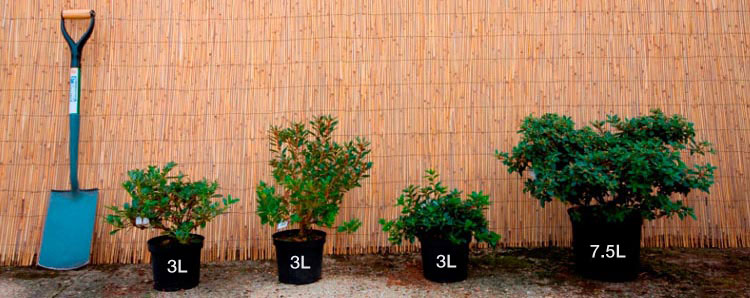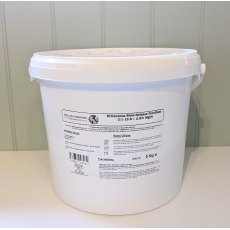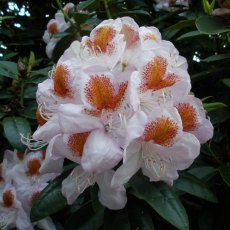Elixir Gardens Sulphur Chips
 In stock
In stock
Collect in Store
This item is available for collection.
Home Delivery
UK mainland delivery from £8.95
Description taken from suppliers website:
Sulphur Chips gives your ericaceous plants the ideal soil pH and conditions to grow properly. They come in the form of an easy to scatter chip grade Sulphur. Many ericaceous plants will not grow, or will show signs of trace element deficiencies if the soil is not ideal for that plant. Most common ericaceous (lime-hating) plants will not grow in limey soils. Sulphur chips will gradually reduce lime content to make the soil suitable for those lime-hating plants.
Directions for Use:
How – Add to soil or compost and thoroughly mix in. Top dress on the surface area and work in by hand or hoe. Safe to use between established container plants where soil conditions are not ideal. For new plants, dig Sulphur in to the top 6-8 inches of soil.
When – Use at any time of year. Sulphur chips will be most effective in warm soils.
Rate of Use – Use 35-55gms per sq.m. It is advisable to wait until the soil warms to see the effectiveness of this application.
If the desired pH is not realised more sulphur will be needed.
Soil pH
This is a measure of soil acidity or alkalinity on a scale from 0-14 units. Neutral soil condition has a pH value of 7; acid soils are lower than this; alkaline (limey) soils have a higher reading.
pH6 Acidic
pH7 Neutral
pH8 Limey
Soil Testing
Soil pH is easily tested by either chemical or electronic D.I.Y. test kits available in most garden shops.
Ideal Soil
Once ideal soil pH is achieved it should be monitored regularly to see it is not creeping back, as lime frequently comes through on chalky soils. Apply remedial Sulphur chips if necessary.
Plant Food
Sulphur is also an important major plant food. Sulphur chips will provide this essential element
Iron Deficiency
Many plants will exhibit chlorosis (yellowing) on limey soils. Correcting the soil condition will provide a permanent solution. Iron will correct these deficiencies quickly and may be an alternative or temporary solution.
Safety
Sulphur is combustible and may evolve toxic fumes in a fire. Fire fighting measures douse with water. Store safely in the original container away from heat sources. Wash hands after use.
Images shown are for illustrative purposes only.
The Basics
Ideal soil
Acidic soil, good organic content, pH 4.5-6.0. Inkarho range of rhododendrons will tolerate soils up to pH7.5
Sun or Shade
Light dappled shade is best for most varieties.
Shelter
Refer to hardiness rating. Give young plants protection.
Site Selection
Avoid close to trees, roots, invasive weeds, walls, hot patios, dry banks and waterlogged soils. Do not use weed matting or stone mulch.
Plant spacing
Use the height shown in 10 years as a guide to the distance between each plant. Allow room for plant to fill out. If planting closer for instant impact, be prepared to move plants after a few years.
Compost
- 3 litre pot, dig in 10-20 litres of ericaceous compost.
- 7.5 litre pot, dig in 20-30 litres of ericaceous compost.
- 70-80cm specimen, dig in 60 litres of ericaceous compost.
- 100-120cm specimen, dig in 120 litres of ericaceous compost.
Planting depth
Plant high in the ground, with the top of the rootball visible.
Feeding
Slow-release ericaceous feed recommended in March and straight after flowering.
Mulch
Recommended every few years.
Water
The key ingredient! Keep moist all season, especially the critical time at end of June for flower bud initiation. Tap water is better than no water. Heavy dose at least once per week in dry weather.
Drainage
Ensure good drainage in winter, especially with yellow flowering varieties. Avoid waterlogged sites.
Pruning
Rhododendrons and Camellias: Not normally required. Tidy wayward shoots after flowering.
Evergreen azaleas and Bloombux can be clipped into a low hedge.
Magnolias and Acers: Formative pruning when young to shape into a tree or bush.
Deadheading
Remove old flower-heads, particularly on young or weak plants.
For further advice see here
Size Guide

Delivery & Returns
Our website calculates the delivery charge according to weight and delivery location throughout the UK. To see these charges, please enter your postcode at the checkout, and you will see the charge vary as you add more items to your wheelbarrow.
 Millais Nurseries
Millais Nurseries












